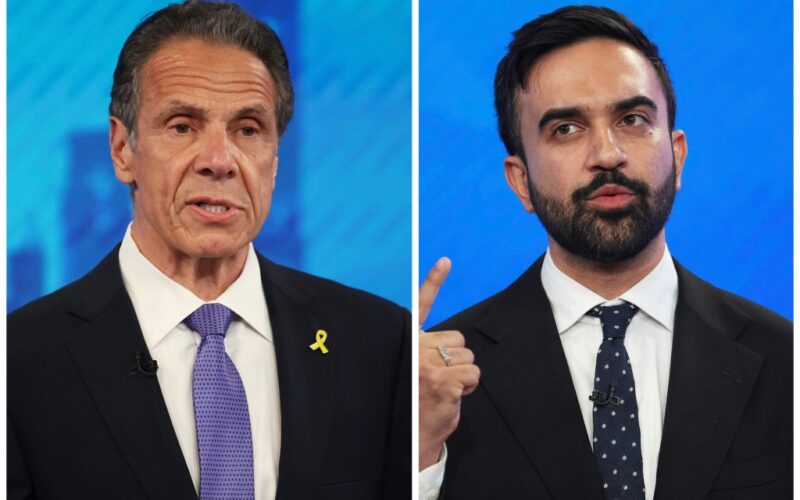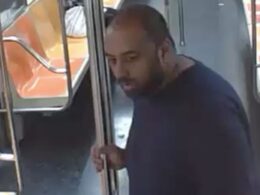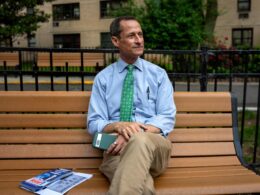Zohran Mamdani stepped into a simmering political quagmire earlier this week when he was asked on a podcast about a term seen as deeply offensive by many Jews — the word “intifada.”
Mamdani explained during the interview with The Bulwark Tuesday that pro-Palestine protest chants like “globalize the intifada,” to him signify a call for Palestinian human rights. He noted the word has been used by the U.S. Holocaust Museum when translating into Arabic the history of a Jewish uprising against the Nazis.
It might seem a perplexing position: For decades, anyone with hopes of leading New York City, which has the largest Jewish population outside of Israel, has seen strong support of Israel as a given.
But the ground has shifted in the wake of the Oct. 7 terror attacks by Hamas and Israel’s subsequent military campaign in Gaza, particularly among younger voters.
New York is sharply divided on the issue. The Democratic primary comes as antisemitic hate crimes have surged in New York City, outrage runs high over the killings of Palestinians in Gaza and the Trump administration is pulling funding from universities, claiming antisemitism concerns.
Cuomo struck back at Mamdani on Wednesday, slamming him for saying the word intifada was “subject to interpretation,” and the former governor has continued to hammer the issue.
“At a time when we are seeing antisemitism on the rise and in fact witnessing once again violence against Jews resulting in their deaths in Washington D.C. or their burning in Denver – we know all too well that words matter.
“They fuel hate,” Cuomo said in a statement. “They fuel murder.”
Mamdani, who would be the city’s first Muslim mayor and was born in Uganda, said Wednesday that he feels “an obligation to speak out against violence and against bad faith or misinformed efforts to manipulate language in ways that only contribute to the division we’re seeking to overcome.” He’s also spoken out about death threats amid an NYPD hate crimes investigation into allegations that a man threatened to blow up his car.
Amid the deep division and latest flare up, though, more classic local issues such as political experience and the affordability of living in the city have by and large received more air time from candidates than the conflict in the Middle East.
Cuomo has generally focused more on Mamdani’s age and relative lack of experience. Meanwhile Mamdani has aimed his attacks on Cuomo’s donor base for overlap with Trump supporters and slammed the ex-governor as part of a broken political machine that care little about working New Yorkers.
The divisions over Israel and Gaza are unquestionably intense. The conflict has emerged as a classic wedge issue with the potential to drive turnout among the candidates’ respective bases. At the same time, New Yorkers largely have such deeply held opinions on the question that it is tough for candidates to change minds in a sharply divided city.
“You can’t win on Israel anymore,” said Hank Sheinkopf, a longtime pro-Israel Democratic strategist, who firm has done consulting work for a PAC in opposition to Mamdani. “But you can win on experience, and you can win on policies that don’t stand.”

A city divided
Over the last 18 months, large demonstrations on both sides of the issue have gripped New York. Hate crimes have surged. Support for Palestine has been particularly strong among younger, more progressive voters.
Many establishment Democrats continue to voice strong support for Israel, including Reps. Chuck Schumer and Ritchie Torres in Washington, D.C., as well as Cuomo and Mayor Adams locally.
Mamdani has taken a different approach. He has voiced strong support for the Palestinians in Gaza and sharp criticism of Israel’s military efforts. He has used the term “genocide” to describe Israel’s actions — a term many find offensive.
That approach comes amid a changing political landscape.
A national Quinnipiac poll released last week found that an all-time high percentage of voters expressed that their sympathies lay more with Palestinians than Israelis, with 37% saying they supported Israelis more and 32% saying Palestinians.
Among Democrats, just 12% said their sympathies lay with Israelis, with 60% saying they sided with Palestinians.

Locally, a recent Emerson poll found that 46% of poll takers did not think it was important that the next mayor have a pro-Israel stance, compared to 33% who believed it important they do.
Final days
Polls show a tightening race between the frontrunner Cuomo and Mamdani with just days before voting closes.
Other candidates, including Comptroller Brad Lander, who’s consistently polling in third and is seeing a boost in momentum following his arrest, are looking to break in amid high voter turnout. Over 212,00 have already cast their ballots in early voting as of Friday morning.
In the final days, a super PAC backing Cuomo is sending mailers, airing TV advertisements and expanding their ground game, criticizing Mamdani’s proposal to raise taxes on the wealthiest city residents to fund free buses and childcare. Mamdani, for his part, is painting Cuomo as part of the same old political establishment that has ignored the concerns of working people for years.
Israel and Gaza are unquestionably critical to many voters, but that doesn’t mean that — at this point in the game — they provide the best opportunity for candidates to win over undecided voters or flip those who’ve already made a decision, experts say. Bread and butter issues like affordability, housing and public safety will likely take take center stage in this race as Election Day nears, Democratic strategist Trip Yang told the Daily News.
“Certain communities and certain constituencies and certain activists certainly care about this a lot,” he said, “but it’s not the main factor citywide.”
With Chris Sommerfeldt
Originally Published:








